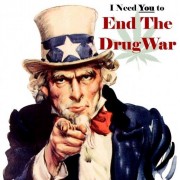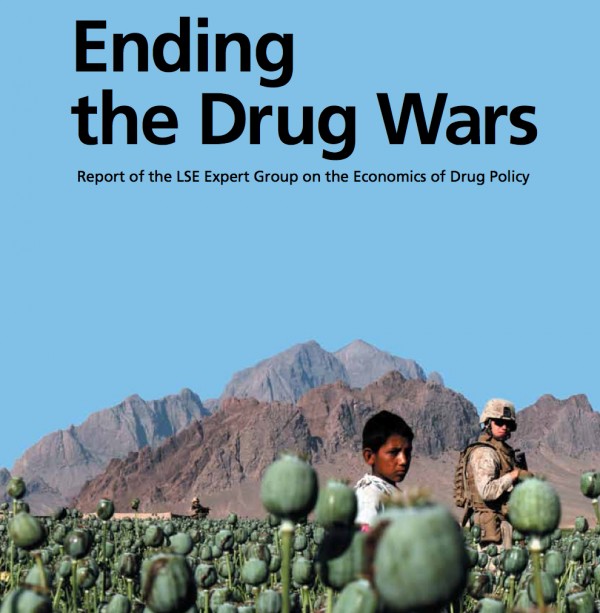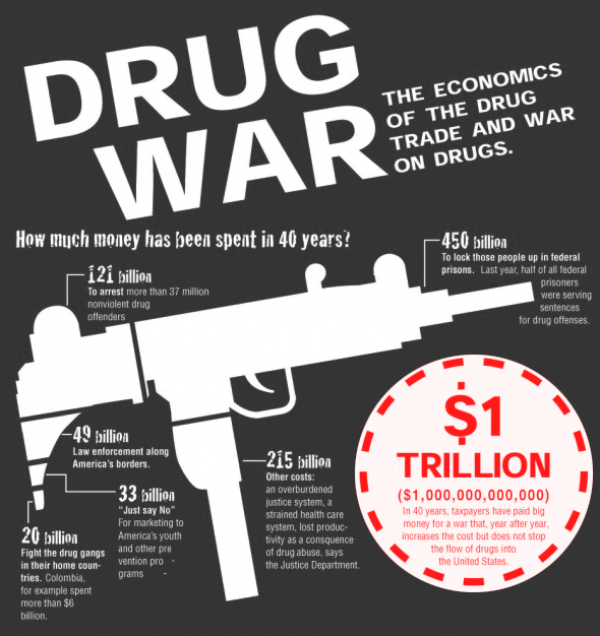HUFFINGTON POST: The decades-long global war on drugs has failed and it’s time to shift the focus from mass incarceration to public health and human rights, according to a new report endorsed by five Nobel Prize-winning economists. The report, titled “Ending the Drug Wars” and put together by the London School of Economics’ IDEAS center, looks at the high costs and unintended consequences of drug prohibitions on public health and safety, national security and law enforcement. “The pursuit of a militarized and enforcement-led global ‘war on drugs’ strategy has produced enormous negative outcomes and collateral damage,” says the 82-page report. “These include  mass incarceration in the US, highly repressive policies in Asia, vast corruption and political destabilization in Afghanistan and West Africa, immense violence in Latin America, an HIV epidemic in Russia, an acute global shortage of pain medication and the propagation of systematic human rights abuses around the world.” The report urges the world’s governments to reframe their drug policies around treatment and harm reduction rather than prosecution and prison. […] In addition to contributions from Quah and a dozen other foreign and drug policy experts, the report has been endorsed by five past winners of the Nobel Prize in Economics: Kenneth Arrow (1972), Sir Christopher Pissarides (2010), Thomas Schelling (2005), Vernon Smith (2002) and Oliver Williamson (2009). Also signing on to the report’s foreword are a number of current and former international leaders, including George Shultz, secretary of state under President Ronald Reagan; Nick Clegg, British deputy prime minister; and Javier Solana, the former EU high representative for common foreign and security policy. MORE
mass incarceration in the US, highly repressive policies in Asia, vast corruption and political destabilization in Afghanistan and West Africa, immense violence in Latin America, an HIV epidemic in Russia, an acute global shortage of pain medication and the propagation of systematic human rights abuses around the world.” The report urges the world’s governments to reframe their drug policies around treatment and harm reduction rather than prosecution and prison. […] In addition to contributions from Quah and a dozen other foreign and drug policy experts, the report has been endorsed by five past winners of the Nobel Prize in Economics: Kenneth Arrow (1972), Sir Christopher Pissarides (2010), Thomas Schelling (2005), Vernon Smith (2002) and Oliver Williamson (2009). Also signing on to the report’s foreword are a number of current and former international leaders, including George Shultz, secretary of state under President Ronald Reagan; Nick Clegg, British deputy prime minister; and Javier Solana, the former EU high representative for common foreign and security policy. MORE
REPORT: Ending the Drug Wars [PDF]
CNN: The Mexican government has been fighting a war with drug traffickers since December 2006. At the same time, drug cartels have fought each other for control of territory. More than 60,000 people have been killed from 2006 to 2012, according to Human Rights Watch. MORE
CNN: Mexican drug cartels take in between $19 and $29 billion annually from U.S. drug sales. MORE
CNN: There are approximated 6,700 licensed firearms dealers in the U.S. along the U.S.-Mexico border. There is only one legal firearms retailer in Mexico. Nearly 70% of guns recovered from Mexican criminal activity from 2007 to 2011, and traced by the U.S. government, originated from sales in the United States. MORE
RELATED: Uruguay has published regulations for a new, legal marijuana market, a measure approved by lawmakers there in December. The law and the new regulations make Uruguay the first country in the world to have a system regulating legal production, sale and consumption of the drug. In  announcing the marijuana regulations, presidential aide Diego Canepa reminded everyone that the state will control the marijuana market from beginning to end, starting with setting prices. “The value of the gram of marijuana sold at pharmacies in the regulated market will be set by the President’s office through the control agency,” Canepa said. That’s right. The Uruguayan government has created an agency whose mission is to regulate the pot market, known as the Institute for the Regulation and Control of Cannabis. The proposed price starts at 20 Uruguayan pesos per gram (about 87 cents in U.S. dollars), Canepa said. People can grow as many as six plants at home and produce a maximum of 480 grams per year, according to the published rules. Cannabis clubs of anywhere between 15 and 45 members will be legal. MORE
announcing the marijuana regulations, presidential aide Diego Canepa reminded everyone that the state will control the marijuana market from beginning to end, starting with setting prices. “The value of the gram of marijuana sold at pharmacies in the regulated market will be set by the President’s office through the control agency,” Canepa said. That’s right. The Uruguayan government has created an agency whose mission is to regulate the pot market, known as the Institute for the Regulation and Control of Cannabis. The proposed price starts at 20 Uruguayan pesos per gram (about 87 cents in U.S. dollars), Canepa said. People can grow as many as six plants at home and produce a maximum of 480 grams per year, according to the published rules. Cannabis clubs of anywhere between 15 and 45 members will be legal. MORE
RELATED: According to a new survey from Public Policy Polling, Marijuana has become more popular in the two months the law legalizing recreational use of the drug has been in effect in Colorado. The poll found 57 percent of Coloradoans now say they think marijuana usage should be legal, compared with 35 percent who say it should not. The 22-point spread has widened from the 10.5-point spread by which voters passed the 2012 Colorado referendum legalizing small amounts of possession and growing in the state. MORE
![]() BUSINESS INSIDER: A congressman and
BUSINESS INSIDER: A congressman and  top Drug Enforcement Administration (DEA) official had a tense, five-minute exchange about marijuana legalization at a recent congressional hearing, the radio show “This American Life” reported on its latest episode. That debate at a March 4 Oversight Committee Hearing began when U.S. Rep. Steve Cohen, a Democrat from Tennessee, asked the DEA’s second-in-command, Thomas Harrigan, how his views on marijuana had changed during 30 years in law enforcement. “To be quite honest with you, sir, very little,” Harrigan answered. “I was afraid of that,” Cohen quickly replied. When Harrigan tried to say more, the congressman interrupted him and told him he had said enough. “The fact that it’s changed very little shows that you haven’t kept up with society,” Cohen said. “You haven’t kept up with science.” MORE
top Drug Enforcement Administration (DEA) official had a tense, five-minute exchange about marijuana legalization at a recent congressional hearing, the radio show “This American Life” reported on its latest episode. That debate at a March 4 Oversight Committee Hearing began when U.S. Rep. Steve Cohen, a Democrat from Tennessee, asked the DEA’s second-in-command, Thomas Harrigan, how his views on marijuana had changed during 30 years in law enforcement. “To be quite honest with you, sir, very little,” Harrigan answered. “I was afraid of that,” Cohen quickly replied. When Harrigan tried to say more, the congressman interrupted him and told him he had said enough. “The fact that it’s changed very little shows that you haven’t kept up with society,” Cohen said. “You haven’t kept up with science.” MORE


